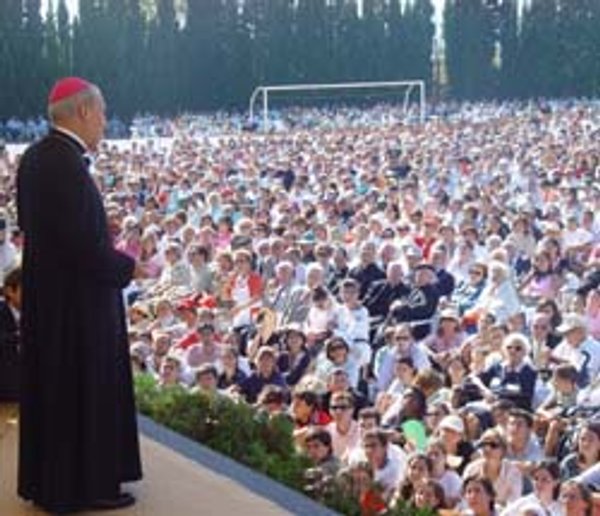The new relief of St. Josemaría in the Barcelona basilica commemorates his lifelong veneration for Our Lady of Mercy, and in particular a visit he made there in 1946 to entrust his first trip to Rome to her protection. The likeness is the work of Joan Mayné, the sculptor who carved the reredos of the Torreciudad Marian shrine. The dedication took place on Sept. 17 in the presence of the basilica’s patrons and a large number of the faithful. The Archbishop of Barcelona, Lluís Martínez Sistach, presided.
Bishop Echevarría referred to this ceremony the following day when he addressed a large number of the faithful of Opus Dei and their friends at Viaró, a secondary school for boys in the Barcelona suburb of San Cugat del Valle: “Yesterday I had the good fortune to kneel before the statue of Our Lady of Mercy. I united myself to the prayer of our Father in 1946 and on the other occasions when he came to ask Our Lady for the needs of the Church and the Work.” The Prelate also urged his listeners to continue their efforts “to draw ever closer to Mary, our Mother, and to have more confidence in her intercession. She is eager to help us, especially when we find ourselves in moments of trial.”
After these opening remarks, the get-together continued with family-style questions and answers, uninhibited by the throng of people attending it. Prominent topics were the Christian family, education, and the sanctification of work. Some speakers introduced characteristic episodes from their experiences in striving to practice the teachings of St. Josemaría.
The Prelate asked his listeners to pray for Pope John Paul II: “We have to pray always for the Pope, whoever he may be. At the moment, he is an elderly and infirm man, but as determined to carry out God’s will as he was when he began, in whatever is asked of him. It doesn’t seem to matter to him whether he has the extraordinary agility of his first years or whether—as now—he can barely move. Whatever the circumstances, he is immersed in God. Evidently he sees the hand of God in his advanced age and disabilities, convinced that they also enable him to help the Church.”
“Don’t be strangers to the suffering of others.”

When someone asked him about the meaning of pain, Bishop Echevarría reminded him how important it is to embrace the Cross with joy: “St. Josemaría used to say that one can suffer, one can cry, one can have great pain, but what one must not do is be sad. For what made Christ sad was not pain, but the way people left him alone.” The Prelate added that we must never “be strangers to the suffering of others. It can happen to us and to our family members, too. So we need to show our love to anyone who is physically troubled and needs our companionship.”
With respect to marriage, the Prelate encouraged couples “to live every day with the same loving attitude they had on their wedding day. If you want your marriage to be very happy, look at each other and love each other and respect each other with that same initial enthusiasm of complete self-giving.”
With respect to the sanctification of work, he insisted on going deeper into the vocation God gave all humans when he created them to work: “Get rid of the idea that work is a punishment. Work is our way to give glory to God. Rather than being a punishment, it is how God intended for men and women to mature, growing into His image and likeness.”
The next day, September 19, Bishop Echevarria planted a tree in the garden of Brafa, a school of Opus Dei in the working class district of Barcelona (Nou Barris), to commemorate its 50th anniversary.
Later in the day he and several other bishops took part in the episcopal consecration of Jaume Pujol Balcells, the new archbishop of Tarragona, a coastal city south of Barcelona.
The Prelate said on this occasion, “I congratulate with all my heart the clergy and faithful of the primatial archdiocese of Tarragona on receiving a new shepherd. Every bishop is put in charge of a local church to represent Jesus Christ, who came on earth to serve. I am certain that Bishop Pujol accepted the Holy Father’s appointment with complete readiness to serve all the faithful of Tarragona. There can be no doubt that he will be a father to all of you, ever eager to put himself at the disposition of the clergy and the people in truth and charity, for he learned directly from St. Josemaría Escrivá de Balaguer how to serve the Church as the Church wants to be served. For me, it is a great joy to share this day of communion with my brothers in the Spanish episcopate and so many priests and faithful of Catalonia, and I pray that this city of Tarragona, which has given so much to the Church, will continue to yield abundant and increasing fruits of service.”
